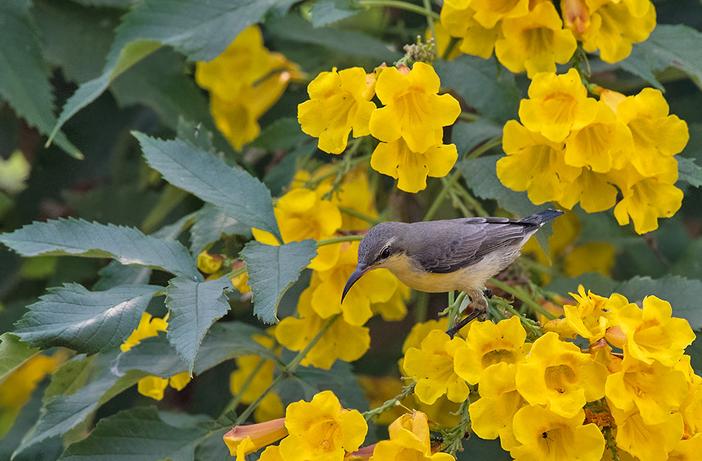Yellow Trumpetbush
(Tecoma stans)
Yellow Trumpetbush (Tecoma stans)
/
/

Koshy Koshy
CC BY 2.0
Image By:
Koshy Koshy
Recorded By:
Copyright:
CC BY 2.0
Copyright Notice:
Photo by: Koshy Koshy | License Type: CC BY 2.0 | License URL: https://creativecommons.org/licenses/by/2.0/ | Uploader: Koshyk | Publisher: Flickr




































































































Estimated Native Range
Summary
Tecoma stans, commonly known as Yellow Trumpetbush, is a deciduous to semi-evergreen shrub or small tree native to open woodlands and forest edges in Central America, South America, the Caribbean, and Mexico. It can reach a height of 20 feet (6 meters) and a width of 2-4 feet (0.6-1.2 meters). The plant features sharply toothed, opposite green leaves and produces large, showy, golden yellow, trumpet-shaped flowers that are bell-shaped to funnel-shaped, often with reddish veins in the throat. These flowers are highly attractive to bees, butterflies, and hummingbirds, and bloom year-round in warmer climates.
Yellow Trumpetbush is valued for its continuous flowering, drought tolerance, and ability to attract pollinators. It is commonly used in urban landscaping, as a border plant, and for naturalizing areas. It thrives in full sun, requires low amounts of water once established, and prefers well-drained soils. It is easy to propagate from stem cuttings. However, Tecoma stans can be invasive outside its native range, so it is important to check local regulations before planting. In some regions, it is considered a noxious weed due to its aggressive growth and ability to outcompete native species.CC BY-SA 4.0
Yellow Trumpetbush is valued for its continuous flowering, drought tolerance, and ability to attract pollinators. It is commonly used in urban landscaping, as a border plant, and for naturalizing areas. It thrives in full sun, requires low amounts of water once established, and prefers well-drained soils. It is easy to propagate from stem cuttings. However, Tecoma stans can be invasive outside its native range, so it is important to check local regulations before planting. In some regions, it is considered a noxious weed due to its aggressive growth and ability to outcompete native species.CC BY-SA 4.0
Plant Description
- Plant Type: Shrub, Tree
- Height: 10-25 feet
- Width: 10-20 feet
- Growth Rate: Rapid
- Flower Color: Yellow
- Flowering Season: Winter, Spring, Fall, Summer
- Leaf Retention: Evergreen
Growth Requirements
- Sun: Full Sun
- Water: Low
- Drainage: Fast, Medium
Common Uses
Bee Garden, Bird Garden, Border Plant, Butterfly Garden, Deer Resistant, Drought Tolerant, Fire Resistant, Fragrant, Hedges, Hummingbird Garden, Potted Plant, Rock Garden, Showy Flowers, Street Planting
Natural Habitat
Open woodlands and forest edges
Other Names
Common Names: Trumpet-Flower, Trumpetbush, Yellow Bells, Yellow Elder, Trumpet Flower, Yellow Elder, Yellow Trumpet-Flower, Ginger-Thomas, Geelklokkies, Bois Pissenlit
Scientific Names: , Tecoma stans, Stenolobium stans, Tecoma stans var. angustatum, Tecoma incisa, Bignonia stans, Bignonia incisa, Stenolobium incisum, Tecoma stans var. apiifolia, Bignonia sorbifolia
GBIF Accepted Name: Tecoma stans (L.) Juss. ex Kunth